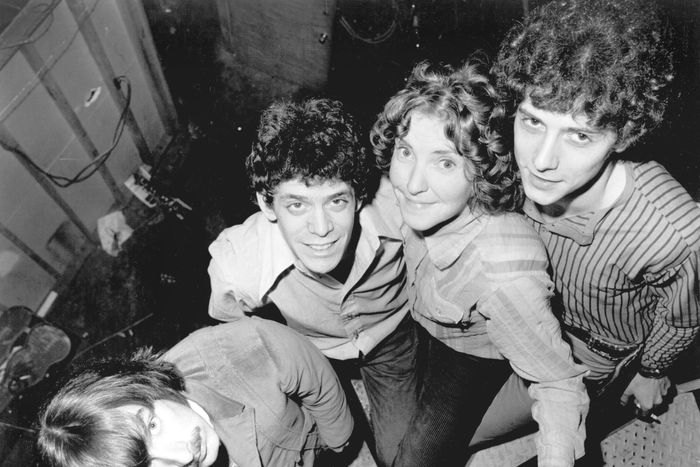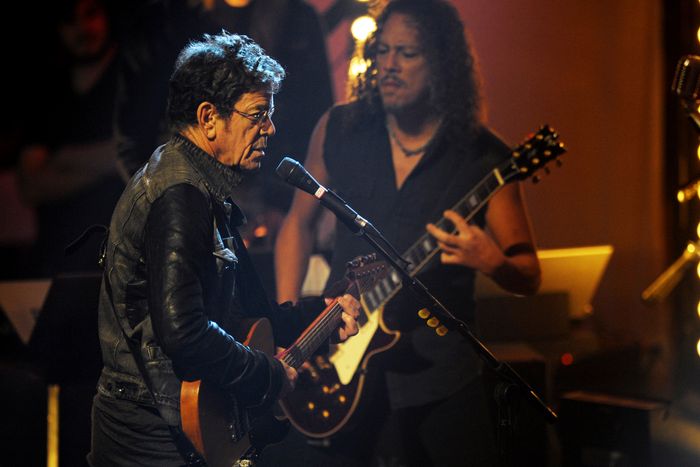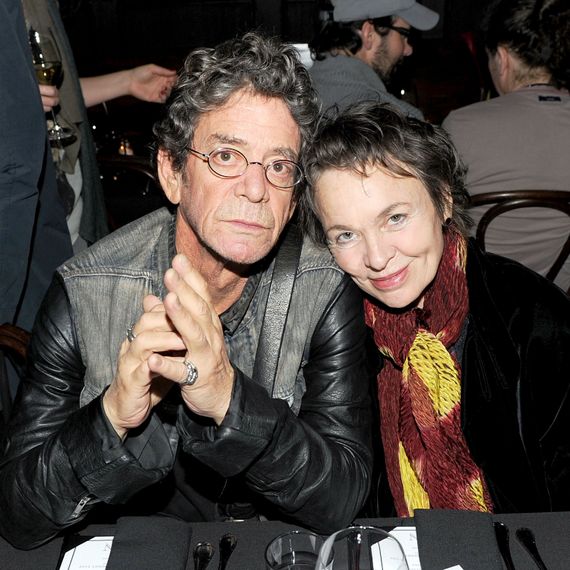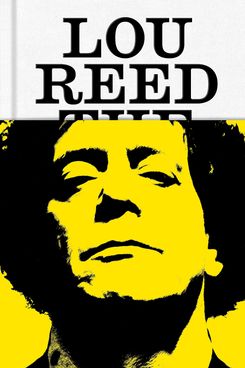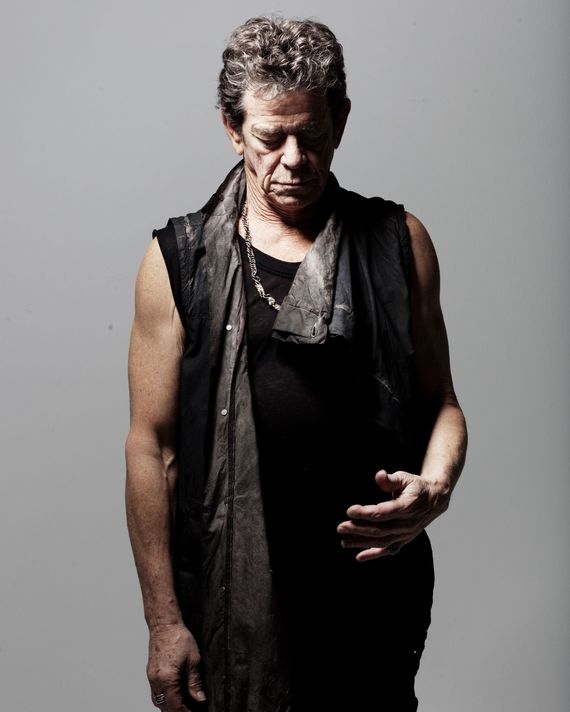
Excerpted from LOU REED: The King of New York. Published by Farrar, Straus and Giroux. Copyright © 2023 by Will Hermes. All rights reserved.
In 2010, Lou Reed planned to perform with Gorillaz for their headlining set at the Glastonbury Festival, a highlight of a busy summer. Then his health took a downturn. The trouble began in Australia, where he and his partner Laurie Anderson had been invited to curate the Sydney Vivid Festival. They’d invited Hal Willner, Emily Haines, the Blind Boys of Alabama, and Master Ren Guang Yi, who gave free tai chi lessons; Anderson performed a low-frequency outdoor concert composed primarily for an audience of appreciative dogs. (“They barked for five minutes,” she recalled. “That was one of the happiest moments of my life.”) At a press conference, Reed answered questions patiently, in marked contrast with one at Sydney Airport 30-some years prior. When asked about plans for his next album, he hedged. “I haven’t figured out just what would be a great thing to do right now, that would make a difference — for me, for you,” he said, noting that he was trying to come up with something “really astonishing.”
In fact, he would. But at the moment, Reed seemed tremendously frail. Along with his diabetes, he’d begun interferon treatment for his hepatitis C. But it was painful and terribly debilitating. He’d fallen on a moving sidewalk in an airport, assistants had to physically help him out of chairs, he dozed off during a presentation by Anderson, and in rehearsals was even having trouble recalling his own songs. Most performers would have withdrawn from public view. But Reed pushed on.
In June he managed to play Glastonbury with Gorillaz, on the festival’s iconic main stage. He was backdropped by a giant cartoon image of himself as a sort of anime punk yakuza, in a motorcycle jacket, shades, and elaborate headphones, eating guitar cords with chopsticks like they were ramen noodles. The real-life Reed, however, was a small, ailing old man, in a windbreaker, baggy shorts, black socks, and beige shoes. His hands trembled as he played, and the bassist Paul Simonon recalls him losing the thread; at one point in the song, “he was supposed to be singing, but he wasn’t; he was looking at me, with a bemused look.” Reed ultimately rallied, croaked out the verses, unleashed some mighty feedback, and raised his hands in the air, while tens of thousands roared.
Later, he would come up with that “really astonishing” album idea. It was born of his third Robert Wilson project, which reimagined the “Lulu” plays of Frank Wedekind. Like Edgar Allan Poe, Wedekind was a writer with whom Reed had a spiritual kinship. The son of a gynecologist, Benjamin Franklin Wedekind was born in Germany in 1864. He loved winding up the bourgeoisie — Wedekind was jailed in his 30s for publishing satirical poems insulting the wrong people. His plays addressed teen sexuality, queer desire, and bogus morality; the posthumously published memoir Diary of an Erotic Life chronicled the gourmandizing author working his way through a brigade of cocottes and sex workers. His breakthrough works Erdgeist (Earth Spirit) and Büchse der Pandora (Pandora’s Box) centered on Lulu, an amoral femme fatale whose affections destroy her lovers, male and female, one by one.
Lulu is both victim and monster, the product of a misogynist, homophobic culture, and the embodiment of its worst fears. The Lulu narrative was an obvious choice for Wilson, given his German audience, and a perfect fit for Reed, who’d worked on Paul Auster’s Lulu on the Bridge and whose nickname back in the Factory days was, in fact, Lulu. Reed laid into the writing. By then, his failing health was being mirrored in his dog, Lolabelle — the rat terrier he and Anderson doted on so intensely, who was dying of pancreatic cancer and undergoing increasingly elaborate treatments (for a time, the couple had her set up in an oxygen tent). Torn up over it, and surely frustrated by his own infirmities, Reed created extreme music, alternately raging and tender.
“He was going through a difficult period,” recalls Wilson, who marveled at the intensity of Reed’s work, swinging from the “very aggressive and loud” to “the softest, quietest sound one could make … These two extremes, to me, is what Lou was all about.” Lulu premiered on April 12, 2011, in Berlin. The same month, Reed began recording an album with Metallica in Marin County, California. The collaboration was highly unlikely. Metallica was one of the biggest rock acts in the world, just coming off its largest tour — a two-year run that packed global sports arenas and grossed over $200 million. The hyperbutch thrash-metal was far from Reed’s approach to rock music, but the group had broad tastes and wasn’t averse to experimentation. They’d recorded an album with Michael Kamen and the San Francisco Symphony, and as they prepared to celebrate their 30th year as a band, they were thinking about legacy. For an all-star concert celebrating the Rock and Roll Hall of Fame, they backed Reed on a fierce pair of Velvet Underground covers: a bludgeoning “White Light/White Heat,” and a “Sweet Jane” that suggested the guitarist Kirk Hammett had, like most hard-rock guitarists of his generation, been weaned on Rock ’n’ Roll Animal. The musicians all enjoyed the experience, and when the idea was floated to do a full album of Lou Reed songs in the same vein, everyone was onboard.
Then Reed suddenly changed his mind and decided that instead, he wanted to record material from Lulu with Metallica. The idea was not well received, even by his own management. “I remember to this day how viciously angry he got with me, that I thought the greatest hits was a better idea,” says Tom Sarig, who managed Reed. “To him it was like disrespecting his Lulu songs.” After a couple of uncomfortable days, Sarig gave in and endorsed Reed’s idea. The band had reservations, but similarly went along with it. They gave Reed a royal welcome when he arrived in the Bay Area to begin recording, and set up a portion of their studio building as his exclusive domain, dubbing it “Lou’s Lounge,” a private space where he could retreat to do tai chi, deal with his medications, and nap, which he needed to do regularly. The men let Reed take the creative lead, since the songs and lyrics were his. But they expected to have input as well, and there remained doubts about the material.
The sessions were not stress-free; according to the drummer, Lars Ulrich, Reed challenged him to a fight after a disagreement (Ulrich declined). Reed’s health had stabilized since Australia, but he was still dealing with tremendous pain and was often foggy; weeks into the sessions, he was still referring to the front man, James Hetfield, as “Hatfield.” Reed was reaching for maximum freedom in his vocal delivery — “just kind of acting it and singing it at the same time,” as he put it — and his delivery could feel disconnected from the band. And even by Reed’s standards, the Lulu lyrics were often shocking, with Reed’s gruff, croaking delivery conjuring Lulu’s voice. “I would cut my legs and tits off / When I think of Boris Karloff,” the record began. Reed’s explicit additions to Poe’s work in “The Raven” were mild compared with lines in “Pumping Blood,” where Lulu, bleeding to death at the hands of Jack the Ripper, begs the killer to do his worst: “I swallow your sharpest cutter / Like a colored man’s dick.” Equally startling is a section where Reed yells for “James” to “top” him (a sly echo of Reed’s “Whip it on me, Jim” outro on the Velvets’ “Sister Ray”). Images of fisting and coprophilia flash through “Mistress Dread.” On “Iced Honey,” he yells in a parched voice over Metallica’s roaring din, “And me, I’ve always been this way / Not by choice.”
But the finale, “Junior Dad,” was something else. The album’s quietest song, with lyrics written roughly two years prior, it was delivered with a tenderness that had scant precedent in Reed’s work. The verses moved through a Freudian minefield of parental failure and childhood
fears. The singer asks to be saved from drowning, to be kissed on the lips, and envisions their dead father driving a boat. Awakening from a dream, the singer sees how time had “withered him and changed him,” perhaps both of them, invoking the “greatest disappointment.” A father’s disappointment in a child, a child’s disappointment in the father, the child realizing they’d become the parent: Take your pick.
Listening to the playback, the lyrics cut Reed’s bandmates to the core. Hetfield’s dad abandoned him when he was 13; Hammett’s had been physically abusive toward him and his mother, then abandoned them, and had died just a month prior. “I had to run out of the control room,” Hammett said; “I found myself standing in the kitchen, sobbing away. James came into the kitchen in the same condition. He was sobbing too.” Reed shed his share of tears, too. One night during the sessions, he took a break to catch U2 in Oakland with Willner and their friend Jenni Muldaur. When the band paused and noted his presence — Bono calling him “a great man,” Larry Mullins Jr. singing the chorus of “Perfect Day” a capella and shouting “We love you, Lou!” — Reed wept.
The recording was rapid-fire by Metallica’s usual standards — there were rarely second takes — and was done in a couple of months. Any doubts about the project were pushed aside. The day before the album was released, Reed received the insignia of Commander of the Order of Arts and Letters; Antonin Baudry, cultural counselor of the French Embassy, described Reed as “one of the major American writers of our time.” In that honor’s wake came the response to Lulu in the press, which was as harshly polarized as the reception to Berlin. Old-guard critics were mostly measured, but on the internet, the new guard let loose. Pitchfork gave it a 1.0 on a scale of 10, finding parts “laughable” and the full work “exhaustingly tedious,” while Consequence of Sound gave it an “F” and declared it “a complete failure.” Fan reactions online ranged from enthusiastic to baffled to nasty to hilarious; parody videos abounded. At least one clip featured a cat having a panic attack triggered by the music. Another sampled the 2004 German film Downfall, about Hitler’s final days, grafting on subtitles that show him sputtering in rage at news of the Metallica project: “Lou fucking Reed? That cunt from Velvet Underground? That ancient sack of shit wouldn’t know metal if it bit his shriveled cock off!” Reed and Willner had a hearty laugh over that one. But in general, the response to Lulu wasn’t amusing. Press events were hair-trigger.
At the album release in New York, Reed’s bitchiness toward reporters led to Hetfield storming out of the event. “I understand that to some 13-year-old in Cape Girardeau, Missouri, it can all seem a little cringeworthy,” Ulrich told a writer for Spin, “but to someone raised in an art community in Copenhagen in the late ’60s, that was expected.” In public, the musicians gushed over the project and one another. “They are my spirit brothers,” Reed told another journalist, with Hetfield and Ulrich beside him. “Every time I listen to the record, I pray to God I was so lucky to meet these guys.”
Still, there’d be no collaborative tour, and no U.S. production of Wilson’s Lulu. The truth was that the album was a difficult listen at best, especially given the disconnect between Reed’s delivery and the band’s. And disconnected from Wilson’s stagecraft, the songs were strange, often unpleasant and incoherent things. Except, however, for “Junior Dad.” Shape-shifting like “Sister Ray” over its 19 minutes, the finished recording was powerfully emotive. Its sound and imagery conjure the sea that enraptured Reed as a kid, roiling in a groove as hypnotic as the Velvets’ “Ocean,” cresting in majestic stumbles that one observer likened to recurring heart failure, as Reed begs to be saved, to be loved, it would seem, by a father who taught him only “meanness” and “fear,” the singer savoring the sibilant salt of the phrase “psychic savagery” as the song drifts into a warm string coda. “Junior Dad” took its place among Reed’s finest work, and as the last song on the last studio album released in his lifetime, one might consider it the closing passage of the Great American Novel he’d often suggested was serialized in his LPs, his “So we beat on, boats against the current, borne back ceaselessly into the past.”
Reed devoted much of his final two years to writing. He published a preface to a new edition of Delmore Schwartz’s In Dreams Begin Responsibilities and Other Stories. There were also plans for books of his own, including a volume on tai chi, possibly even a memoir. He also revived the notion of turning the New York album into a narrative work, this time as a stage musical, one more mainstream than his Wilson collaborations, and which could be rooted in his hometown. “We were working with CAA’s Broadway Department on a sort of a remake of the plot of West Side Story — Jets versus Sharks — set to the songs,” says Sarig. “Eric Bogosian was committed to writing the book, and Bill T. Jones was going to direct it. We were putting the whole team together when he passed. It would have been great.”
In a turning of the tables, Reed took a stab at music criticism, reviewing Kanye West’s Yeezus LP for the artist-centered website Talkhouse. At the time, the two could almost be seen as kindred spirits, artists who subverted the status quo, with sometimes questionable tactics, while becoming consequential enough to be acknowledged by sitting presidents. Reed felt West was essentially daring his audience to like his creative choices, and much of what he said of Yeezus might be said of his own albums. “Very perverse,” Reed concluded. There were recording projects on deck, too, including a standards set with Willner, for which they’d begun selecting songs. Reed also played a handful of what turned out to be his final shows in Europe, enlisting a brilliant young guitarist, Aram Bajakian, and a violinist, Tony Diodore, who doubled on guitar. Reed was in rough shape, but the shows were among the most powerful he’d ever played. He hadn’t done a proper U.S. tour in nearly a decade, and booked a string of California dates for the spring, including one at the prestigious Coachella Festival in April. Kevin Hearn was making the set list — a “greatest hits” of sorts — when he got a call from Reed. “Kevin,” he said, “I’ve got bad news.” Reed was dying, and his last hope was a very risky liver transplant. Years prior, Hearn had been through a near-death battle with blood cancer, and Reed frequently noted that his bandmate had come back from a place few ever see. In the coming weeks, the two spoke frequently. In one conversation, Reed described an extravagant new speaker system he’d just bought. “If I’m going to kick the bucket,” he told Hearn, “I’m going to do it while listening to the best possible sound.”
Reed’s final public musical performance was in Paris, at the Salle Pleyel, a classical-music concert hall. On March 6, 2013, he sang “Candy Says” with Anohni and the Johnsons, and given his condition, the “hate” of the main character for their body, and all it required, took on a very particular meaning. Reed sang the opening lines in a ravaged voice, reaching for the key as the band played hushed changes. Anohni stood in shadow, head bowed, hands clasped in a sort of prayer, as Reed sung-spoke his words according to his own metrical sense, improvising with a Jimmy Scott–style playfulness. And as he began the “doo-doo-wah” coda, Anohni joined him, quietly, gracefully, in a voice barely there until it was, rising to meet Reed’s. They traded and finished each other’s lines, both asking what they’d see if they could walk away from themselves, and Reed repeating the line “maybe when I’m older,” which was now an invocation of great faith.
In May, Reed flew to the Cleveland Clinic in Ohio, chosen for its reputation with organ transplants. “It’s medical tourism,” Anderson, the Midwesterner, conceded wryly. “You send out two planes — one for the donor, one for the recipient — at the same time. You bring the donor in live, you take him off life support … I was completely awestruck. I find certain things about technology truly, deeply inspiring.” According to Reed’s transplant surgeon, the liver was “less than perfect.” But Reed understood his situation and didn’t hesitate. “It’s good enough for me,” he said. “Let’s go.”
His new liver began working immediately, and Reed was soon doing tai chi, kvetching about the hospital food, and getting his strength back. Family and friends came to visit. His sister talked about seeing the Velvet Underground in Cleveland when she was in college. When it was quiet, you could hear the helicopters nearby, taking off and landing, transporting organs and patients.
Reed was soon home and, though weak, returned to work. There was optimism, even opportunities to laugh. The satirical news publication the Onion ran an item titled “New Liver Complains of Difficulty Working with Lou Reed.” (“‘It’s really hard to get along with Lou — one minute he’s your best friend and the next he’s outright abusive,’ said the vital organ, describing its ongoing collaboration with the former Velvet Underground frontman as ‘strained at best.’ ‘He just has this way of making you feel completely inadequate.’”) In June, Reed commuted near-daily to Masterdisk, the recording facility on West 45th Street, to work with Willner and his co-producer Rob Santos on remastering his early solo catalogue, a project Reed had long wanted to do. Reed savored and scrutinized much of his life’s work. He swooned over Bowie’s backing vocals on “Satellite of Love.” He pumped his fist to Berlin’s “Lady Day.” He time-traveled through the binaural space of “The Bells.” “He took so much joy from rediscovering these records,” Wilner says. “And being able to sit there in the room with him while he was doing it? Whew. I felt like the luckiest person in the world.”
After the final day of mastering, Reed and Willner went to record their radio show with a guest: the actor Natasha Lyonne, a friend of Willner’s and a huge Reed fan (Reed was a fan of hers, too, admiring her work in the new series Orange Is the New Black, which he watched while he was in the hospital). Discovering they’d just finished Reed’s back-catalogue remastering, Lyonne suggested they listen to some songs. As a rule, Reed never played his own recordings on the show. But they made an exception. Willner recalls Reed saying, “I can’t believe we’re getting to do this while I’m alive.”
Reed also managed a trip to Europe in June, where he attended the Cannes Lions International Festival of Creativity, the world’s premier ad-industry gathering. In a public dialogue with the creative partner Tim Mellors, Reed groused about MP3s and the digital distribution of music, praised Kanye West (“The only guy really doing something interesting”), and thanked the ad industry, from which he’d earned a small fortune. “In a world of downloading, the only people who will pay you for what you do is you guys,” Reed said. “Ad people play fair with you.” Reed got involved in a major ad campaign that fall, in fact, for high-end headphones developed by a French company, Parrot; he helped design an app optimizing the headphone EQ for rock music. A photo shoot for the campaign, scheduled with Jean-Baptiste Mondino for September 30 in New York City, included a filmed interview conducted by Farida Khelfa. Reed, wearing a distressed black leather jacket over a skull-motif T-shirt, appeared diminished and spoke with a faint tremor in his voice. The interview got off to a typically testy start: When asked if his father had gotten him a guitar when he was young, Reed snapped, “My father didn’t give me shit.” Deadpanning, he claimed he never went to school, and that he slept with his amp. But soon he softened, waxing poetic about the magic of aural perception, about being in a hospital and hearing your blood flow during an ultrasound.
Asked about his earliest sound memories, Reed said his was the same as everyone’s: his mother’s heartbeat. “And that’s why we love PPWHOH, PPWHOH, PPWHOH,” he said, beatboxing the primal rhythm. “It’s so simple.” He also described the sound of love, which he conjured by pursing his lips and softly blowing, as if to dislodge the fluff of dandelion seeds.
On October 4, Reed joined the photographer Mick Rock at the John Varvatos clothing store — located on the Bowery in the building that had formerly housed CBGB — for a book-release event. Transformer was a coffee-table volume assembling many of Rock’s iconic images of
Reed — images that defined him as an artist. Nico appears in several, as do Bowie and Warhol. Rock’s photos of Reed with Rachel Humphreys didn’t make the cut. Nearly a decade earlier, Reed wrote a short essay for a small-circulation art magazine. It considered a black-and-white photograph by Robert Frank, a death meditation that showed the phrase “sick of goodbye’s” [sic] written in paint that drips like blood on the surface of two mirrors, one reflecting a hand gripping a skeleton figurine. “To wish for the crazy times one last time and freeze it in the memory of a camera,” Reed observed, “is the least a great artist can do.” There was a bit of that spirit in Modino’s final ad image: Reed’s face in a close-up, jowls succumbing to gravity, laugh lines like trenches, hair and eyebrows streaked with white, eye bags puffy. But within them, Reed’s eyes are full-bore, staring down the lens, while in the foreground, in soft focus, is his clenched fist — an expression of street-fighter strength at a moment when Reed was about as weak physically as he’d ever been.
In the months, then weeks, before his death, Reed fretted about his legacy, worrying that time would erase him. Julian Schnabel recalled rewatching the Berlin film with Reed, and his friend wondering at what impact he’d made. “He always felt, in a way, unappreciated,” Schnabel said. “He never felt like people really got it.” Reed’s sister recalls him
saying point-blank: “I don’t want to be erased.”
When Reed’s body began rejecting the liver, he was flown back to Cleveland for follow-up care. But little could be done. When the doctors told him they were out of options, Anderson recalls, he fixated just on the word “options.” Kevin Hearn flew out to help with what, at this point, was hospice care. “It became very personal,” Hearn says. He recalls Reed speaking to a doctor, parsing the difference between the words “faith” and “hope.” (“‘Hope’ leaves room for failure,” Reed explained, “but ‘faith’ is the belief that things will be a certain way.”) One day, mirroring his New York routine, Reed had Hearn take him up to the hospital roof. Reed lay down on the tar paper in his gown and looked up at the sky. “Kevin, aren’t you coming down here with me?” Reed asked. Hearn lay beside Reed. He recalls Reed yellow from jaundice, face thin, body wasting. Reed began to weep and thanked Hearn for coming. “You mean so much to me,” Reed told him. He kissed his friend. The next day, Reed flew back home to die.
In the end, not even Lou Reed wanted to die in New York City. He and Anderson went out to the house on Long Island, near the ocean he was raised by and that had informed his imagination for a lifetime. He spent his last days with friends, listening to music and floating in the heated pool. Willner and their friend Jenni Muldaur stayed overnight. “We didn’t talk much,” Willner recalled. “We just lay there with him, and he had me DJ. And as we were [listening], he sat up and told us that ‘I am so susceptible to beauty right now’ and just lay back down … I can still see the goosebumps on him.” Willner’s playlist included the Shangri-Las’ “Remember (Walking in the Sand),” Frank Ocean’s “Forrest Gump” and “Sweet Life,” Radiohead’s “All I Need,” Valerie June’s “Tennessee Time,” Nina Simone’s “When I Was a Young Girl,” Big Joe Turner’s “Lipstick, Powder and Paint,” Roberta Flack’s “Ballad of the Sad Young Men,” Jonathan Richman’s “Roadrunner,” and unsurprisingly, Ornette Coleman’s “Lonely Woman.”
Reed and Anderson stayed up all night that Saturday, talking and doing breathwork. When daybreak came, he asked to be helped to the porch. “Take me into the light,” Reed said — his final words, spoken on a Sunday morning. “As meditators, we had prepared for this — how to move the energy up from the belly and into the heart and out through the head,” Anderson said. “I have never seen an expression as full of wonder as Lou’s as he died. His hands were doing the water-flowing 21-form of tai chi. His eyes were wide open. I was holding in my arms the person I loved the most in the world, and talking to him as he died. His heart stopped. He wasn’t afraid.” Anderson made the appropriate calls, but wanted to spend some final hours in the house with Reed. That night, Willner, Hearn, and others joined her, listening to music, talking, and crying alongside Reed’s body, laid out and surrounded by things he loved, among them a tai chi sword and a guitar.
